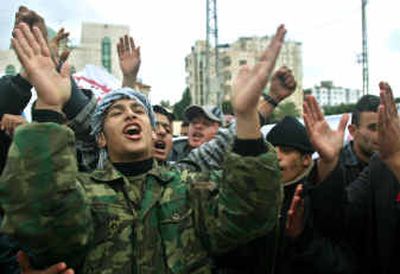Arafat’s influence strong in Palestinian election

RAMALLAH, West Bank – Anyone who didn’t know better might have thought that Yasser Arafat was alive and well and running for Palestinian Authority president.
Seven candidates, led by front-runner Mahmoud Abbas, kicked off a 15-daylong electoral campaign Saturday, with most if not all seeking to capitalize in some fashion on the memory of the Palestinian icon, who died Nov. 11 at 75.
Arafat’s image adorned campaign posters and newspaper advertisements; his name was invoked freely in speeches and campaign slogans.
One candidate seeking to succeed Arafat, Mustafa Barghouti, sought literally to assume the late leader’s mantle, donning a checkered black-and-white keffiyeh headdress like the one that had been Arafat’s trademark. He staged his opening campaign event a few steps from Arafat’s grave.
All the candidates sounded similar themes: calls for Palestinian statehood and demands that Israeli soldiers and Jewish settlers leave the West Bank, Gaza Strip and east Jerusalem.
“Israel must withdraw from all Palestinian lands it occupied in 1967,” Abbas said in his inaugural campaign speech, referring to the capture of territories from Jordan and Egypt in the Middle East War. “The occupation must end.”
The stylized nature of the speeches and campaign events underscored candidates’ unwillingness to distance themselves from Arafat, who was revered by Palestinians as a symbol of their national struggle – even though many of them grumbled over his inability to govern effectively, to clean up corruption or to come to an agreement with the Israelis leading to statehood.
Abbas, now the interim Palestinian leader, quit the post of prime minister in disgust when Arafat repeatedly quashed his efforts to rein in the fractious Palestinian security forces and carry out other reforms. Abbas also differed openly with Arafat over tactics used in the Palestinian uprising that began four years ago, saying armed conflict and suicide bombings had been a mistake.
None of that, though, prevented Abbas from pledging continued loyalty to the late leader. Using Arafat’s “nom de guerre,” he said: “We tell Abu Ammar this: All you have said in the past, it is our duty to carry out.”
Israeli officials have not appeared unduly bothered by Abbas’ professions of fealty to Arafat. One senior official in the government of Prime Minister Ariel Sharon said Abbas’ credentials as a moderate were well established, but that Israel recognized he had a domestic constituency to court and challenges by hard-liners to fend off.
Hamas, the largest and most powerful Palestinian militant group, has made plain its intention to claim a share of political power. Hamas is not contesting the Jan. 9 presidential election, but partial unofficial results indicated its candidates made a strong showing in municipal elections last week.
Official results were to be announced today.
Abbas, 69, also is coping with rivalries within his ruling Fatah faction, which has a restive “young guard” eager to come into its own. Chief among them is Marwan Barghouti, 45, a popular ex-militia leader who considered running against Abbas from an Israeli jail, but eventually dropped the idea. Marwan Barghouti is serving multiple life sentences in connection with terrorist attacks.
With Marwan Barghouti’s wife, Fadwa, watching from a seat on stage, Abbas demanded the release by Israel of Palestinian prisoners, singling Marwan Barghouti out for particular mention. When Fadwa Barghouti spoke, her mention of her husband’s name drew raucous cheers.
Israel has pledged to try to keep military activity to a minimum during the campaign, but its troops continued to hunt the leaders of militant groups.
On Saturday, Israeli soldiers killed a prominent West Bank leader of the Al-Aqsa Martyrs Brigade, a militia loosely linked to Fatah.
Troops surrounded a building in the Jenin refugee camp where the wanted man, Thaer Abu Kamal, was holed up, then demolished the house with anti-tank missiles and a bulldozer after he refused to come out.
Abu Kamal’s body was found later in the wreckage.